|
 |
Choritz Family
|
|
The picture below is of the
Choritz family taken circa 1924 in Kupiskis. It includes the mother and
seven of her nine children. The father of the family, Zeev-Peretz Choritz,
had been killed in a robbery of his grocery store in November, 1914. Four
robbers, who were forestry workers or wood choppers and customers of the store,
committed the crime. What happened to these criminals is not known, as the
Lithuanian courts were disbanded shortly thereafter, with the approach of the
German Army.
The family subsequently was forced to leave Kupiskis at the beginning of World
War I for Tambov. When they returned in 1921-22 or so, they began to plan
for the family to go to Bot River, South Africa, where Zeev Peretz Choritz's
brother Yehuda-Mordechai Choritz and his wife Chaia-Pese Bedil Choritz had
settled. The first son to leave was Samuel Choritz, who went to Tel Aviv,
Palestine, in 1924, and then onto South Africa in 1926. For that reason,
Samuel (1904-1974), is not in the photo. Also missing was Eliash-Pinchas
Choritz, born 1900, who died as a toddler.
|

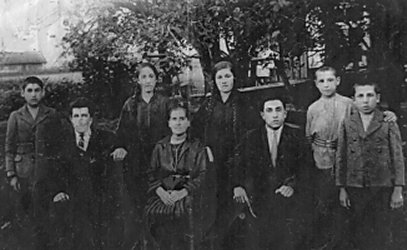 |
Front row, seated, left to right: Icik-Kadesh (Yitzhok) Choritz
(1892-1941), Chaia-Etla bat Abel-Iosef Blacher Choritz, (1877-1940),
Israel Choritz (1905-1975).
Back row, standing, left to right: Chatzkel (Charles) Choritz
(1909-1990), Annie Choritz Blieden (1906-1987), Celia Choritz Sibul
(1907-1998), Elias-Yechiel (Giel) Choritz (1915-1997), Isadore (Isser)
Choritz (1913-1997). |

| |
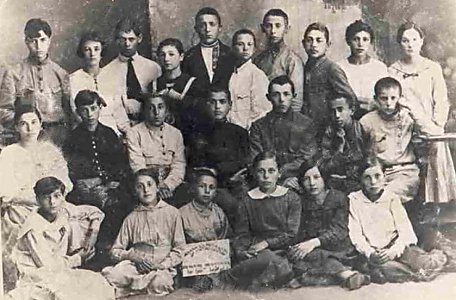 |
|
The photo depicts a
Youth
Bund group possibly taken in Tambov, where the Choritz family fled to in
1915, during World War I. The girl seated second from left in the
front row is Annie Choritz and the boy seated third from left in the
middle row is Israel Choritz.
Most of the Jewish citizens of Kupiskis left either by walking, horse and
cart, or by train for the east. They went in single or multiple
family groups. Some went as deep into Russia as Siberia, some went
as close as Latvia. They were forced to remain until the War was
over and many took years to return, if they did at all. Life was
very hard during this time and some starved. During their time away
from Kupiskis, the Jews of Kupiskis had children (and those attended
school, joined youth groups), married, died and otherwise continued their
lives. They found what work they could to survive.
In the Choritz family, their father Peretz Choritz had already been killed
in 1914 before the War started, and they fled to Tambov with their
grandfather Dov Ber-Zalman Choritz, their mother Chaia-Etla and the six
children. During their time in Tambov, their grandfather died,
leaving them quite destitute. One of the children, Samuel Choritz,
managed to survive by selling soap. They returned to Kupiskis in
1921 and strove to leave Lithuania for South Africa for better
opportunities.
All the children did leave with the exception of the eldest Icik-Kadesh
(Yitzchak) Choritz, who won several million Litas in the Lithuanian
lottery. He invested this in a street full of property in Kupiskis.
His good fortune and decision to stay in Lithuania was ultimately regrettable
as he and his family were killed in 1941.

|
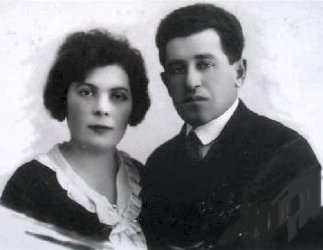 Yitzhak and Rivka Choritz Yitzhak and Rivka Choritz |
| |
Rivka Fainberg, born 1903, daughter of Leib and Feige-Hinde (Michel)
Fainberg. See paragraph above for more information about Yitzhak.
Their children were Peshe, born 1930, Chaya-Dvoira, born 1934,
Freide-Hinde Choritz, born 1939, and Chaim, born 1940.
|
|
(Photos were donated by Lazer Choritz in
memory of his father Israel Choritz and family.) |
| |
|
Musings of a Jewish Genealogist:
The
Lottery
by
Ann Rabinowitz
|
The small shtetl of Kupiskis was alive with business. It
was Thursday, market day, and the peasants, thronged the
dirt-packed roads, muddy from the spring rains, their
produce and goods, packed neatly in their wooden carts,
pulled by their shaggy worn horses. They headed for the
square, where temporary wooden booths were setup and their
carts could be parked to trade away the daylight hours.
Nearby, were the teahouses and taverns, ready for
refreshment, a favorite run by the beautiful Jaffe sisters.
There was also beer brewed fresh and frothy, tapped from
barrels brought that day by the Trapido family from nearby
Rokiskis town, the larger community center, where the vodka
was pressed from potatoes, strong and potent, while kosher
wine, for those so inclined, held a place of honor behind
the counters.
In the firehouse, Mr. Bodas, the fire chief, readied for the
day, anything could happen on market day. His special
duties though were about to begin. He was the lottery clerk
and he pulled the lottery tickets from his desk and counted
them. This was an important function, lives could change
dramatically, so he was careful and precise. Then, finally
finished, he tucked the papers into his belt, and went to
meet his first customer.
The first one of the day was Icek Kadesh Choritz, eldest of
the Choritz clan, a buyer and seller of animal skins,
colonial goods and other items, poor, but proud, just
married to Rivka Fainberg, counting on the ticket to change
his circumstances.
|
His mother and younger siblings, poor and destitute, without
prospects, were readying for a journey to South Africa, to
their uncle Mordechai-Yehudah. However, he hesitated, he
was loath to leave, if only he could get a winning ticket
and remain, become newly rich and respected.
The day wore on, bartering progressed, goods changed hands,
the noise and clutter of the marketplace peaked. Then, as
the night descended, the peasants repaired to drink and
relax, their pockets filled with silver, their carts empty
except for necessities purchased for the return journey to
their villages.
The Jewish merchants tidied their shops, closed for the day
and readied for another busy day on the morrow, as Queen
Sabbath was arriving, to crown the work week and relieve
them from toil.
The lottery ticket stuffed in every pocket, lay waiting for
the magic moment when the right number would be drawn and
the ticket could be retrieved for untold riches. Who would
win this time was the topic of conversation, amidst the talk
of deals made and bargains obtained.
Eventually, the numbers for the week were drawn and printed
in the local paper, hung on walls in all of the shops, and
talked about throughout the land. This was serious stuff
and times were hard. The lottery could mean freedom from
want and deprivation.
|
Icek Kadesh had bought many tickets
over the years, each time hoping for a winning one, each
time disappointed and despondent when his number wasn’t
picked, but hoping that the next time would bring lady luck
to his doorstep. This time, he had just about given up, but
pulled his ticket stub from his pocket and looked rapidly
over the winning numbers.
He didn’t have to look far, for there on the top of the list
was his number, the winning number, the ultimate prize. His
reaction was amazing as he choked, he screamed, he ran
around his store, grabbing and hugging all the customers, he
ran out in the street, his face red and beaming, to tell the
wonderful news. It had come true, he had won.
He would do many things with his winnings, buy property, a
street full of stores and help his family. Winning was
tinged with sadness, however, for he realized that he was
going to remain in Kupiskis, wealthy and settled, whilst his
family had to leave, sailing across the far ocean to Africa,
and that he would probably never see them again. He could
not help that, it was the hard times, and one had to do what
was best.
Later, when the family departed, his emotions in turmoil, he
prayed that they would do well. The years flew by and his
family, now successful in their “goldene medina” of South
Africa begged him to join them as they missed him, their
elder beloved brother. His wife’s brothers had left as
well. “Come to Africa”, they wrote, “we will wait for you”.
So, they became the only ones in their family to remain in
the shtetl, alone. However, Icek Kadesh had been enticed to
buy more lottery tickets and had won the top prize, yet
again. He could not leave now, despite the entreaties of
his family in Africa, he was thriving, despite the dismal
deteriorating conditions of the country.
A day came, soon enough, when all of the money he had
accumulated could not save him or restrain the savagery that
engulfed the shtetl as the Germans approached. His
neighbors and friends with whom he had dealt with pleasantly
all those years suddenly took up arms against the Jews and
killed them all, buried them all in unmarked pits deep and
broad in an atheists’ cemetery on the outskirts of town.
He and his family perished, his lovely young wife, his
precious children, all gone. Ironically, all that was left
were his lottery tickets on the wall of his shop, prized
possessions, but a sad reminder of how little it took to
change the destiny of a man.
It reminded me of the old Yiddish song popularized by Molly
Picon entitled “Mazel” (or Good Luck) a commodity that can
disappear so quickly. Here is a YouTube rendition of
“Mazel” sung by Leo Fuld, known as the king of Yiddish
songs: Mazel.
|
Epilogue
|
Memory and Forgiveness…
|
Wanting solitude after the rededication ceremony of the Wall
of Memory Holocaust Memorial in Kupiskis, Lithuania, in July
2004, I walked to the edge of the cemetery to a spot where a
bench had been placed under the trees, a place cool and
refreshing. I looked out over the beautiful green verdant
valley of Kupiskis stretching out before me in the distance,
the birthplace of my grandfather.
|
Small frame houses colored yellow, white, and blue rose
above fields of brightly-colored wildflowers, the air
scented with their perfume. Butterflies fluttered in the
wind, birds twittered, and a light mist covered everything.
|
The scene was bucolic and beautiful, reminiscent of the
French countryside; an impressionist could have easily
painted it. That is, until one remembered where one was.
Brutal killings had taken place here, the victims piteously
buried in yawning pits. The villagers, in houses so close,
had heard the screams, listening with closed hearts, to the
cries for help, even the cries of the children, young and
helpless.
|
Alone, I recited Kaddish, the mourner’s prayer, and cried
bitterly in an outpouring of unrestrained grief. I
remembered what had happened here in 1941. I remembered the
murder of my great-uncle Mordechai Yehudah’s oldest nephew,
Icek-Jadesh Choritz and his family, along with countless
others.
|
Softly, someone approached and sat next to me on the bench.
It was Eugenija Urboniene, the woman who had so generously
helped me over the years with information, and had written a
wonderful series of stories about the Jewish community. This
was the first time we had met in person.
|
She quietly put her arms around me and told me of her
feelings of shame at what had happened, her remorse and that
of her family. Her tears flowed as her daughter, who
accompanied her, translated her words into English. Her
brother, the town archivist, stood beside his sister and
niece and wept as well.
|
We cried at the horror, waste, and loss of it all. We were
people, speaking different languages, from different places
and cultures, but able to communicate on the most basic
level about a time that has defied every rational
explanation.
|
|
Someone had finally said they were sorry. It was a moment
that I shall remember always… |
| |
This article was first published on Ann Rabinowitz’s
Facebook page in April, 2018, then in the Jewish Historical
Society of North Jersey, April, 2019, then on the JewishGen
Blog, January 16, 2022.
|
|
Born in Manchester, England, genealogist Ann Rabinowitz is a
resident of South Florida and has been involved in
genealogical pursuits since the age of ten. A prolific
writer, her articles have been published on the JewishGen
Blog, in numerous Jewish genealogy journals, on Facebook,
and in various newspapers. |
| |
|

Mordechai
Yehuda-Lieba, one of the approximately nine children of Dov-Ber Zalman
Choritz, born 1858, and his wife Chaia-Pese Bdil, born 1856.
Taken in South Africa sometime before 1937 when he died. He was
the one who brought the rest of the family to South Africa. |
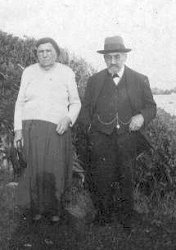
|
|
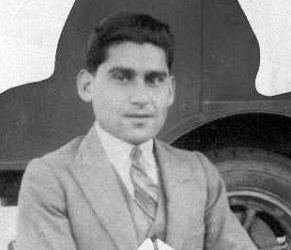
|
Charlie
Choritz, son of Zeev Peretz Choritz, the brother of Mordechai
Yehudah-Leiba Choritz, taken in South Africa |
Taken in
South Africa, the children of Zeev Peretz Choritz,
left to right: Yechiel (Giel), Celia, Samuel, Izrael |
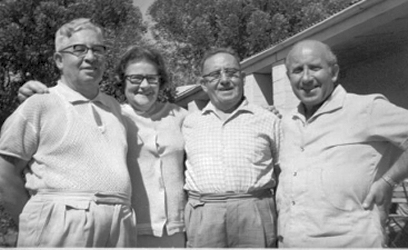
|
|
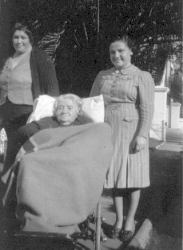
|
Leah
Choritz, the sister of Mordechai Yehudah Leiba and
Zeev-Peretz Choritz. She married Jacob Dick and her daughter Celia
Dick is in the photo with her. |
| Wedding of
Annie
Choritz, daughter of Zeev-Peretz Choritz, to David Blieden in
1939, South Africa |
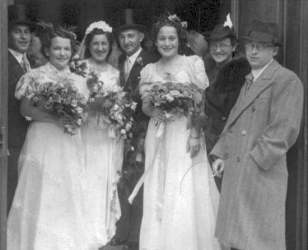
|
|
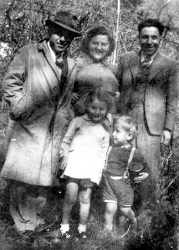
|
Top, l to r:
Israel
Choritz, his wife Sophie Lipshitz Choritz,
brother Izzy Choritz
Below l to r:
Israel's children Pearl Choritz Rogow, Lazer Choritz, dated August 18,
1942
|
| Choritz Family
in South Africa
1- Rachel (Roche) Sibul
Maisel (daughter. of Jack and Celia); 2 - Giel Choritz; 3 - Celia
Choritz Sibul; 4 - Zelda Singer Choritz (wife of Giel); 5 - Jack
Sibul (husband of Celia); 6 - Mrs. Sibul (Jack's mother); 7 - Israel
Choritz; 8 - Sarah Sagor Choritz (wife of Sam); 9 - Pearl Choritz
Rogow (daughter of Israel); 10 - Sam Choritz; 11 - Barry Sibul (son of
Jack and Celia); 12 - Ethel Choritz Sedley (daughter of Giel and Zelda) |
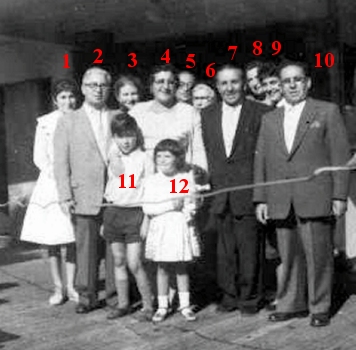
|
|
The
photos above were given to Ann Rabinowitz by the late Zelda Singer
Choritz, wife of Giel Choritz, and the Choritz family |
Back
to Main Families Page
|
![]()

![]()
![]()



 Yitzhak and Rivka Choritz
Yitzhak and Rivka Choritz




